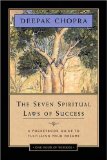Deepak Chopra is one of the leading mind-body-spirit Gurus. He seeks to teach the benefits of incorporating meditation and a healthy lifestyle for increasing inner happiness.
Deepak Chopra was born in New Delhi, India in 1947. He attended the All India Institute of Medical sciences studying western medicine. In 1968 he came to America and began working in a New Jersey hospital. This led to a successful career in medicine in which he became chief of staff at the New England Memorial Hospital. He also established a growing private medical practise. During this time Deepak Chopra says that he used to smoke a packet of cigarettes a day and also he used to drink heavily to calm his nerves. Increasingly he became uneasy at his approach to life and also he became aware of the limitations of Western medicine. He felt there was something missing in his approach to medical care. Therefore he increasingly became interested in Ayurvedic medicine, which stresses a more holistic approach to medical care.
Teachings and Beliefs of Deepak Chopra
After studying the ancient Indian system of Ayurveda and yoga in 1995 He founded The Chopra Center for Well Being in California. This serves as a vehicle for spreading his message of alternative medicine and holistic well being. He sees his mission as
“Bridging the technological miracles of the west with the wisdom of the east”
His main teaching and beliefs are that to attain happiness we need to consider several things. Firstly we should find time for meditation and silencing the mind. This helps us to avoid negative emotions and thoughts. Deepak stresses that negative emotions are like toxins just like bad food could be. He also teaches that we should try to listen to the signals of our body and develop our intuition. With regard to physical health, he says there is a close connection between our physical health and our state of mind. This is why he is often associated as one of the pre-eminent leaders of the mind body spirit movement. To improve physical health he says we should be very careful about what we eat. Also if we can eat in the right consciousness then it will help.
One of his most popular and successful books is the Seven Secrets of Success. In this book, he says that to lead a successful (and happy) life it is important to consider the importance of following one’s true path in life (dharma) with an attitude of detachment and self-giving. Like the Hindu yoga systems, he also believes in the law of karma. (cause and effect). Although he shares many belief systems of Hinduism and yoga he does not seek to promote a version of Hinduism in his lectures and support groups. Although this has not stopped anti-cult Christian groups such as The Christian Research Institute from criticising him for “bringing in Hinduism” through the back door. Such criticisms are widely repeated against many “new age” teachers and gurus.
In 1996 the Weekly Standard published an article by Matt Labash that reported allegations against Chopra. These were denied and Chopra sued both the magazine and Matt Labash for libel. The magazine agreed to a settlement when the main witnesses appeared as unreliable. The magazine later published an apology.
Deepak Chopra has had over 42 books published selling over 20 million copies worldwide. His books range from translations of the Sufi poet Rumi to “A Holistic Guide to Pregnancy and Childbirth” As a public speaker he is also in great demand and has appeared as a keynote speaker at many prestigious events including the inauguration of the State of the World Forum, hosted by Mikhail Gorbachev.
Dr. Chopra is a fellow of the American College of Physicians and a member of the American Association of Clinical Endocrinologists.
Books By Deepak Chopra

Related pages

 Famous Indians – A list of Indian men and women throughout the ages. Categories include politicians, scientists, sports people, spiritual figures and cultural figures. Includes Mahatma Gandhi, Akbar, Swami Vivekananda and Indira Gandhi.
Famous Indians – A list of Indian men and women throughout the ages. Categories include politicians, scientists, sports people, spiritual figures and cultural figures. Includes Mahatma Gandhi, Akbar, Swami Vivekananda and Indira Gandhi.

